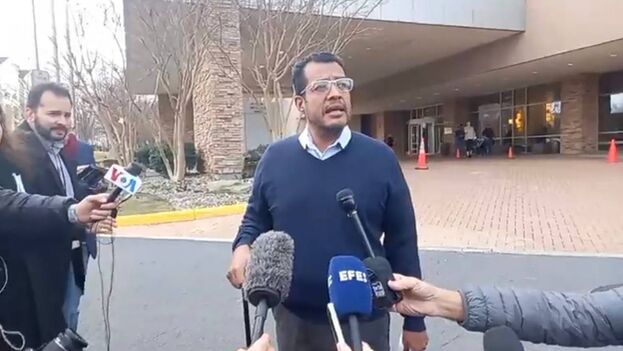
![]() 14ymedio, Yoani Sánchez, Merida (Mexico), 9 February 2023 — When I met Nicaraguan opposition member Félix Maradiaga I knew immediately that Daniel Ortega must hate him rabidly. The activist is the antithesis of the old caudillo: hyperactive, charismatic and an excellent communicator. This Thursday I learned that the former presidential candidate is among the 222 political prisoners that the Managua regime has just sent into exile in the United States. I breathed in relief.
14ymedio, Yoani Sánchez, Merida (Mexico), 9 February 2023 — When I met Nicaraguan opposition member Félix Maradiaga I knew immediately that Daniel Ortega must hate him rabidly. The activist is the antithesis of the old caudillo: hyperactive, charismatic and an excellent communicator. This Thursday I learned that the former presidential candidate is among the 222 political prisoners that the Managua regime has just sent into exile in the United States. I breathed in relief.
The tactic of arresting dissidents, sentencing them to long prison terms and then using them as a bargaining chip with Washington, the Vatican or the European Union has been recurrent among the authoritarian regimes that continue to cast a shadow over Latin America. The Cuban regime has a whole bachelor’s degree and several doctorates in this strategy that has allowed it not only to put pressure on democratic governments to obtain favors, but also to loosen social pressure within the Island.
Ortega is a faithful disciple of Fidel Castro, who used the opponents prosecuted during the Black Spring of 2003 as a bargaining chip with the Catholic Church and the Spanish authorities. Dissidents who were in jail 20 years ago were barely allowed to choose between the bars or exile. Only a few rejected the pressure and remained on the Island. Two of those who stayed, Félix Navarro and José Daniel Ferrer, have been in prison again since July 2021.
Now, moreover, the list of Cuban political prisoners exceeds a thousand people, so Miguel Díaz-Canel must feel that he has enough trump cards to obtain succulent benefits with them. The signs that a trade move is being coordinated behind the scenes could not be more evident: several US officials have recently warned that prisoners of conscience are an obstacle to the normalization of relations between the two countries and Cardinal Beniamino Stella has just visited Havana, from the Vatican, and urged the Cuban President Díaz-Canel release the 9/11 protesters.
The maneuver that Ortega carried out this Thursday may only be a preview of what his Cuban comrades are planning. A consensual action so that both regimes get rid of their critics, deactivate any civic movement born from the demands of an amnesty and, incidentally, receive in exchange some perks that can include economic benefits and diplomatic silences. In the case of Havana, these terms could have the added demands that the island be removed from the list of state sponsors of terrorism, and that the arrival of remittances and tourists from the United States be made more flexible.
So far, it seems that the old tactic of “capture, convict and trade” results in a total win for authoritarianisms, which always end up getting away with it because on the other side of the table democratic governments are willing to give in so that a group of people can embrace their family again and not wither away in a punishment cell. Dictatorships play on all those diplomatic and emotional springs. They feel superior in this field because their “chips” are human lives, an element that has little value for totalitarianism. But they are wrong.
The time that they manage to buy with these maneuvers are increasingly shorter and nor is exile the political death of their adversaries. The Castro regime itself has verified that the repressive blow against 75 opponents, of that two decades ago Black Spring, did not appease the popular discontent that ended up pouring out into the Cuban streets in numbers and with never-before-seen libertarian demands. The leaders expelled from the country were succeeded by others and exile itself gained prominence in the formation of political opinions within the Island.
Daniel Ortega, although it seems that he has Nicaragua in his grasp, has just carried out a maneuver born of desperation. Díaz-Canel may be preparing another similar one, which will also be the result of the urgency felt by a regime with a growing – and increasingly public – popular rejection. Neither of them can expel the millions of citizens who oppose them, nor silence international criticism with these crude stratagems. They know that their dictatorships will fall, and instead of paving the way and opening the door for new players, they continue to play the old cards of yesteryear. The only ones they know, and ones which will lead them, sooner or later, to defeat.
____________
COLLABORATE WITH OUR WORK: The 14ymedio team is committed to practicing serious journalism that reflects Cuba’s reality in all its depth. Thank you for joining us on this long journey. We invite you to continue supporting us by becoming a member of 14ymedio now. Together we can continue transforming journalism in Cuba.
